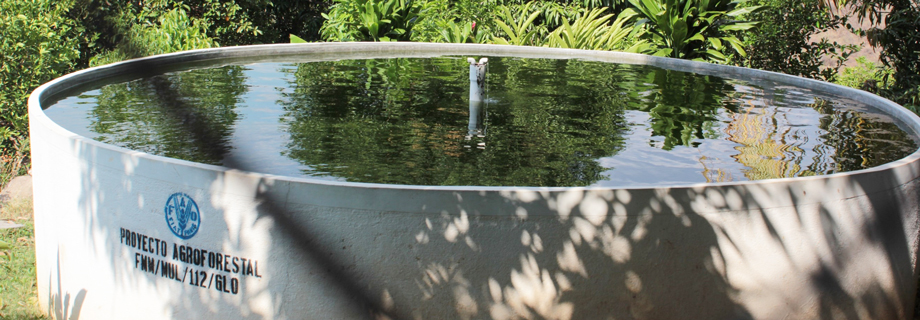Smallholders in Central America weathering the storm with climate-smart agroforestry
Key impacts
- 460 families in Guatemala and 425 families in Honduras supported.
- 57 new hectares under agroforestry management.
- 25 water harvesting tanks (8.5 m3 each) and irrigation systems provided.
- 250 smokeless and wood-saving stoves provided.
- Training was provided on sustainable agriculture including integrated crop management, organic fertilizer, the protection of watersheds and more.
The Dry Corridor of Central America – particularly those areas in Guatemala, Honduras and El Salvador – has become increasingly prone to extreme weather, damaging livelihoods and worsening poverty.
Prolonged droughts, exacerbated by El Niño from 2014-2016, led to over 3.5 million people needing humanitarian assistance. A UN inter-agency study in 2017 drew a direct link between these extreme dry conditions and irregular migration. Family members left behind face the burden of paying the debts of those who have migrated, while almost 50 percent of the families interviewed were food-insecure. The research highlighted the need for long-term programmes to discourage people from emigrating and reduce the impact on the families left behind.
Santos Roberto Lagos, who lives in the corridor, is benefiting from one such programme to scale up sustainable natural resources management practices.
Lagos, 65, and his family have always worked as farmers in the community of Yuculimay Arriba, southern Honduras. Before they began working with FAO, they owned a 2.8 hectare plot where they sowed beans and corn, and a small garden for lemon grass, aloe, mangoes and lemons. The sale of fruit provided most of their income and helped supplement the maize and beans they grew, which were not enough to feed the family for the whole year.
The droughts badly hit production and his ninemember family; the soil on his farm was degraded and the surrounding forest was dwindling.
“This area has a lot of natural watersheds and we were not making the best use of those resources … because we did not have a system of proper water distribution”, Lagos says. “Some places had more water than others; this led to shortages and during the dry season we usually experienced drought.”
He and his family received training on sustainable agriculture, with an emphasis on integrated crop management, orchard management, organic fertilizer, water harvesting reservoirs, irrigation systems, management of agroforestry systems and the protection of watersheds. The project also provided Lagos and his family with fruit trees, orchard seeds and a small irrigation system – a reservoir that stores 8.5 m3 of water.
“Since we received assistance from the project, we learned to make use of an efficient water distribution system that helps us have water all year long”, Lagos says. “We also learned how to introduce varied crops throughout the year, which has increased our production and income.”
His family have become leaders in their community with a 4.9 hectare agroforestry plot that combines mango and lemon trees with basic grains. They have established small plots of vegetables such as cassava, squash, sweet potato and beans, all of which they irrigate with water from the reservoir.
In 2018, Lagos expects to sell one million lemons, double his previous harvests, generating a profit of around 400 000 lempiras (USD 16 878). Now the whole community is copying the model. Their agroforestry systems improved their use of water and increased production for everyone.
The Lagos family is just one of almost a thousand benefiting from the project, which in 2018 is looking to expand operations and help more struggling smallholders to cope with drought. TV and radio spots, and training sessions organized with the Ministry of Agriculture and Livestock and the Forest Conservation Institute, will let others knows about the potential of climate-smart agroforestry.
Project
Climate-Smart Agroforestry Systems for the Dry Corridor of Central America
(FMM/GLO/112/MUL-BABY 03)
Share this page

